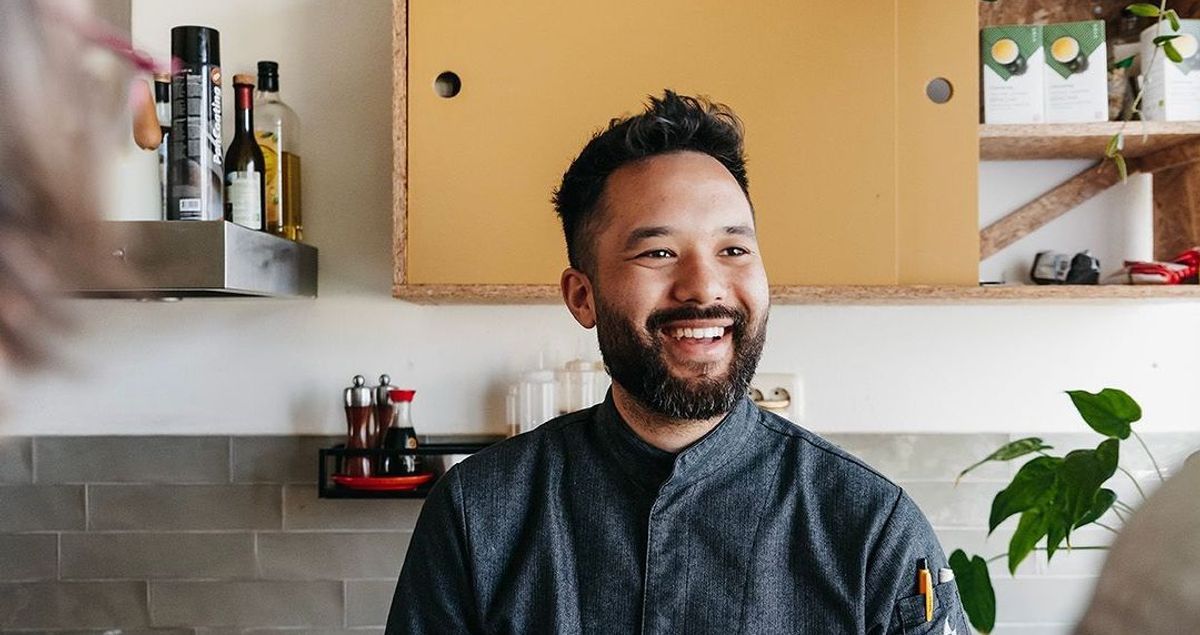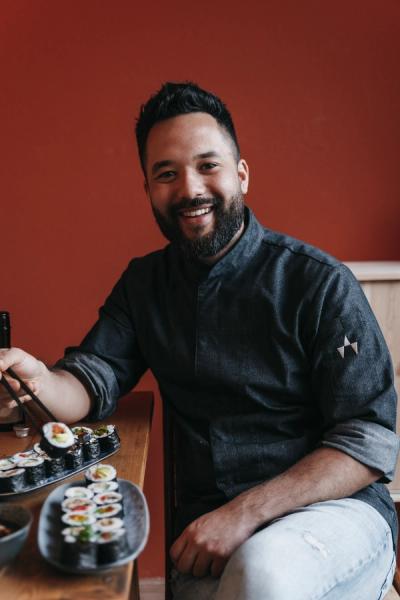
Sushi by Kai:
his recipe for
success
Kai Yasuda is the proud owner of "Sushi by Kai", a small food business. As the name implies, sushi is the focus, but Kai also sells various vegetarian Japanese dishes. His company caters, conducts workshops, and he even gives masterclasses. People can pick up their orders, or he can deliver to their homes.
The idea emerged shortly after he lost his job due to the coronavirus pandemic in August 2020. While biking with a friend, the question arose, "What are we eating tonight?" Kai responded, "I'm making sushi tonight; you're welcome to join." The next day, the friend stressed, "This is so delicious; you should do something with this!"
Smart start
Kai saw a flyer from someone else in the neighborhood selling Vietnamese spring rolls on Sundays and realized he could start with a small investment. So he began selling to friends and family, then quickly expanded to Tuesdays, Thursdays, and Fridays for the rest of the neighborhood.
"I knew that I wouldn't make it with sushi alone, so I cautiously added miso soup, cabbage salad, and other tasty little things," says Kai.
His business slowly but surely got off the ground: "I seized opportunities that felt right," Kai asserts. "Fortunately, my sister is very graphically inclined, so she created a beautiful flyer for me. A friend of mine is a photographer, and he wanted to take photos. The goodwill was very high during covid, so I received many services worth hundreds or thousands of euros in barter deals or even for free."
Many things were new in the beginning. From creating a menu to setting prices. Kai: "I looked at what my competitors were charging, but the most important thing for me was to maintain a healthy margin. That way, I wasn't losing money, but I also didn't need to make too much profit. It had to remain affordable."
He also chose a different concept: "I was doing something other sushi restaurants in the area weren't - I started organic, but not completely vegetarian as it is now. In the beginning, I was still using salmon, mackerel, and tuna. That was very special then, but those are expensive ingredients. So, I probably earned less per roll than I do now, but there's a lot more technique involved now."
I seized opportunities that felt right

Authentic concept
Kai speaks passionately about his business. He describes the concept of "Sushi by Kai" in his own words as 'very simple': "My father is Japanese, and my mother is Dutch. I experienced how my father cooked Japanese dishes in the kitchen from a young age. He was a stay-at-home dad, so I could always learn from him. My father always filled the entire table with various Japanese dishes when we had guests. It was a real feast, picking from a full table.
I advise my customers not only to order sushi, as you can easily overeat on rice. Instead, order many side dishes with a little bit of sushi. That way, you can mix and match and pick at your food all evening."
First promotional phase
Kai started distributing flyers in the neighborhood to give the business more local recognition. Instagram also played a key role from day one: "It's a great medium that can promote small businesses well," he says.
His initial orders came in via the phone: "I distinctly remember getting phone calls or messages saying 'hey, I saw your flyer in the mail' or 'I saw you on Instagram, can I place an order for Thursday or Tuesday?' and that's how things started rolling. It was pretty basic, but the orders started coming in".
Finding a workflow
Kai: "Initially, it was mainly about finding my workflow. When do I go grocery shopping? When do I begin prepping? When do I finish and start packing? Can I deliver it, or does someone come to pick it up? Initially, people had to order a day in advance, but I gradually realized this was a bit early. I didn't need that much time. So then it became order by 12:00 PM the same day. If I went shopping at 12:00, I could start by 2:00 PM.
Nowadays, it's order by 2:00 PM, and pick up on the same day. I already have most of the groceries at home anyway. Some orders also come in earlier, so then I already have an idea of what I need to buy. All in all, a lot of learning was involved in developing such a workflow".
Customer feedback
When asked what he enjoys the most about his work, Kai is decisive: “The most enjoyable moments are definitely when I get to interact directly with my guests. During catering events, masterclasses, or workshops, I can immediately see the results of my culinary skills.
The most rewarding times are when I provide catering, travel to the location, freshly finish everything, and then see everyone enjoying what I have prepared. I serve a few dishes, and then the room or hall quiets. People are truly savoring the food. If you don't find it that tasty, you keep chatting. But somehow, it always goes quiet, and that's the most beautiful thing.”
He is indeed content with the purely positive feedback he has received so far: “In that regard, I really have a successful formula at hand. I'm extremely happy with what I do and dedicate 100% to it. Everything I do comes from me, from inventory management to preparation, delivery, and even being the face of the business. I do everything myself.”
The most enjoyable moments are definitely when I get to interact directly with my guests

Competition
Kai is not unique in his neighborhood for offering sushi, yet he doesn't see other (larger) players as direct competition: “I don't see any competition. My business is called "Sushi by Kai," and I have sushi on the menu, but it's different from the well-known large chains. Those restaurants are often comparable to each other: an explosion of fat, sugar, and sourness. A California roll is packed with fried chicken or shrimp, avocado, cream cheese, sesame seeds, tobiko eggs, nori; you name it. You no longer taste what's really inside.
In my sushi, I deliberately choose two ingredients that pair well together. They complement each other instead of overpowering each other. You taste the rice, the nori, but also the other ingredients. Real vegetables, but still nicely flavored. In this way, you also don't miss meat or fish.”
Growing on Instagram
On Instagram, Kai initially did what felt right and even had the help of someone from whom he learned a lot for a short period. Kai: “Social media is important, and I have quite a foodporn-like concept. Sushi is never camera-shy. As a result, my following has grown quite sizable. It's grown exponentially; I've amassed over 1300 followers in two years. It's become more stable now, so I need to work on it again.”
“Sushi is never camera-shy ”
Reviews are important
"Google is also an important channel for me," says Kai. “I have received many good reviews and consciously ask for them. Kind of like, 'Hey, I absolutely love cooking for you. Could you help me reach more lovely people like yourself?'. So yes, I play on that a bit. And even a single word is enough, it greatly helps to reach more people.
I currently have a stamp system where people can earn discounts. I would like to add that if you express your enthusiasm about me, and people order because of that, there should be some discount action tied to that."
Jack of all trades
Kai is hyper-aware of his various hats: “You're not just the purchasing department, the head chef, the social media manager, but also the delivery guy," he says with a wink.
Because he does everything himself, he knows he shouldn't let himself get overwhelmed: “Look, I don't need to read a manual on how to communicate with customers. I communicate with my customers in my way. Then it's always good. Of course, there are things you do for the first time, but by just doing them, you naturally learn. If I get too busy in the future, I can always get help again, for example, with social media.”
Tough lessons
Many people consider starting a catering business from home, and Kai has learned the hard lessons of actually getting started along the way: “There are always times when things go very well; the orders are flooding in, and you don't really know where it's all coming from. Then you're simply busy and riding a high peak.
But the moment the orders do not come will also come. And those times will be more frequent than when orders flood in. I've noticed that these moments really bring me down emotionally. My wife and family could immediately see and notice that.
I've learned that those are moments when I can spend my energy updating the administration, answering emails, attracting new customers with social media posts, or actively reaching out to someone. My advice to everyone is not to consider these moments as lost because the orders will come back in. You have to have trust in that.”
Don't think of quiet moments as wasted. The orders will come in again, you have to rely on that

Good accounting
Kai: “Something many people overlook is to start immediately with an accounting program. Often, the (cheap) basic plan is already sufficient.
Now, a year later, I'm on the most expensive package. That's not because I have thousands of transactions and invoices but because it helps me establish a stable business and gain insight into my expenses and income. As a result, I know well what I need and what I can let go. Such a program is truly the backbone of my business, together with an accountant.”
Ease through Vev
Kai: “Vev has been a great help in keeping my orders organized. It's incredibly easy for customers as they order themselves via the order page that comes with the ordering software.
It's highly automated; the moment customers can no longer order for the day, the system automatically switches to the next available option.
These are things that make it very easy for me. The majority of the customers I serve don't need to speak to me personally. They want to place their order, and that's it. The personal touch comes when I meet them at their door.
And for those who have questions, they can just give me a call. Thanks to Vev, I have more time to answer these questions thoroughly. The 'standard orders' just come in online, which is a huge advantage for me.
It's also fantastic that I can easily modify the menu, both with photos as well as adjusting the prices, options, and scheduling on my own. The ordering and delivery software is just super easy to use.”
“Vev has been a great help in keeping my orders organized ”
Getting started
If you're thinking of starting a home-based catering business, these are the key lessons to get off to a flying start:
- Kai began with a modest investment, initially selling to friends and family.
- He leveraged his network for help in areas such as graphic design and photography. This way, Kai was able to save on startup costs.
- Kai’s pricing was based on a healthy margin that was affordable for both him and his customers.
- His catering business isn’t solely based on sushi; he also offers a variety of other Japanese dishes.
- In the initial promotion phase, Kai utilized flyers and Instagram to gain recognition in his neighborhood.
- Kai gets a lot of energy from customer feedback and interaction during catering, masterclasses, workshops, and the delivery/pickup of meals.
- Kai differentiates himself from competitors by focusing on the authentic taste of his ingredients rather than overloading sushi with multiple flavors.
- Kai uses Google reviews and Instagram for promotion, and encourages customers to leave reviews.
- Running your own catering business means wearing many hats: from the purchasing department to the delivery guy.
- Kai shares that there will be ups and downs in orders, and the key is to utilize the slow periods to address other aspects of the business, such as administration and marketing.
- Kai emphasizes the importance of having a robust accounting program from the beginning to gain insight into finances.
- He uses Vev for order management, simplifying the process for him and his customers.
Create your own page, just like Sushi by Kai
Describe your business
Vev will create a custom page for you.
Get started
Click around to see how Vev works.
Customize your page
Add photos, descriptions and set your pricing.



